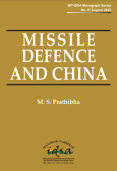DF-41: China’s answer to the US BMD efforts
US efforts to improve and expand its BMD system would degrade Chinese nuclear retaliatory capability thus forcing China to go for a qualitative and quantitative improvement of its nuclear force by deploying more ballistic missiles with MIRV and MARV capability and penetration aids.
- Arjun Subramanian P
- November 12, 2012











